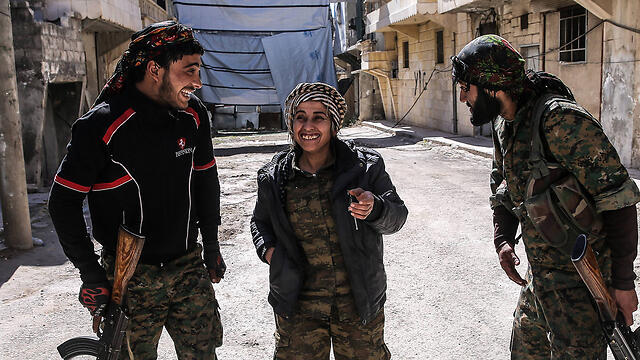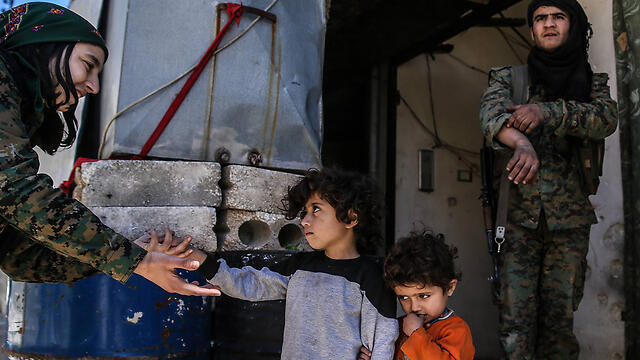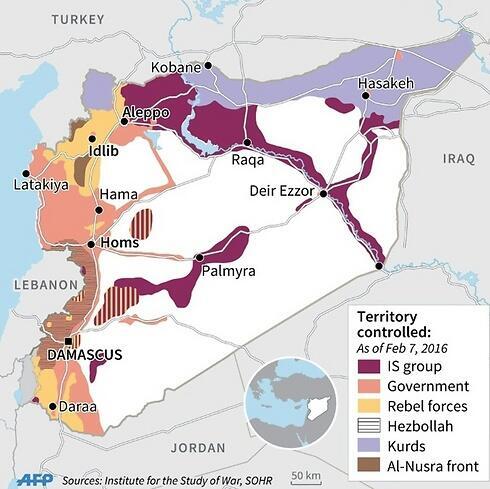A powerful Syrian Kurdish political party is planning to declare a federal region in northern Syria, a model it hopes can be applied to the entire country, a spokesman for the faction said Wednesday.
Nawaf Khalil of the Democratic Union Party told The Associated Press that his party is not lobbying for an only-Kurdish region but an all-inclusive area that would include representation for Turkmen, Arabs and Kurds in northern Syria.
The declaration is expected to be made at the end of a Kurdish conference that is being held Wednesday in the town of Rmeilan in the country's northern Hassakeh province.
It comes as the Damascus government and Saudi-backed rebels are holding peace talks with a UN envoy in Geneva on ways to resolve the country's devastating civil war, which this week entered its sixth year.
Kurds are the largest ethnic minority in Syria, making up more than 10 percent of the country's prewar population of 23 million. They are centered in the impoverished Hassakeh province, wedged between the borders of Turkey and Iraq.
Syria's Kurds have dramatically strengthened their hold on northern Syria during the civil war, carving out territory as they battled to drive out Islamic militant fighters allied to the rebellion and declaring their own civil administration in areas under their control.
A federal region could be a first step toward creating an autonomous region similar to the one Kurds run across the border in Iraq, where their territory is virtually a separate country.
It could also usher in similar demands for federal regions elsewhere in Syria and in effect lead to a partition of the war-shattered country.
However, both the Syrian government and the opposition, at least in theory, reject any form of partitioning of the country.
"As a Syrian citizen, I say we reject talks about a federal Syria ... our people will reject any attempt to divide Syria," Foreign Minister Walid al-Moallem said at a weekend press conference in Damascus.
The minister's remarks came a day after the UN envoy to Syria, Staffan de Mistura, said the possibility of federalism for Syria has not been taken off the table for the peace talks in Geneva.
Russia's Foreign Minister Sergey Lavrov on Monday also said federalization is one possible option in Syria if it is the will of the Syrian people. He said Russia will support whatever solution the Syrian government and the opposition devise to end the country's war, including "any form (of government) whatever it may be called: federalization, decentralization, unitary state."
Khalil distinguished between prevailing autonomous rule for the Kurdish areas - which has been in effect in Syria since 2013 - and the federalism project, which he said was ethnically inclusive.
"The federalism project is a model for all Syria," he said in a phone interview from Germany, where he is based.
A federal region in northern Syria is sure to anger Turkey, which considers the Syrian Democratic Union Party, or PYD, as a terrorist group. Its military wing, the people's Protection Units, or YPG, leads the fight against Islamic State extremists in Syria.
Much of Syria's border with Turkey is now controlled by the YPG-dominated Syrian Democratic Forces - an alliance that includes Kurds, Arabs and Christians - which has distinguished itself from the Syrian government and the mainstream opposition in the country's civil war.
The Kurdish move comes at a critical juncture in the conflict.
A two-week-old Russia and US-engineered partial cease-fire is holding and peace talks have resumed this week in Geneva. Moreover, Russia on Tuesday began withdrawing the bulk of its troops from Syria, signaling an end to Moscow's five-and-a-half month air campaign. That move raised hopes for more meaningful discussions in Switzerland where de Mistura is holding proximity talks with both the Syrian government team and the representatives of the moderate, western-backed opposition.
Russia's defense ministry said another group of its aircraft left the Russian air base in Syria on Wednesday and is returning home.
NATO's Secretary General Jens Stoltenberg welcomed Russia's decision. In an interview with The Associated Press, he said it's a contribution to efforts to reduce military tensions and find a peaceful solution to the Syrian conflict.
Stoltenberg, who spoke during a visit to the Afghan capital of Kabul, said the consequences of the withdrawal are yet to be seen but that he "would welcome any action that reduces the military tensions in Syria."
Meanwhile, Russian President Vladimir Putin's spokesman said Moscow is satisfied with the joint work with Washington on coordinating Syria peace efforts. Dmitry Peskov said Wednesday the Syrian peace process is the main focus now for Moscow and Washington.
He hailed Washington's "readiness to coordinate those efforts."




